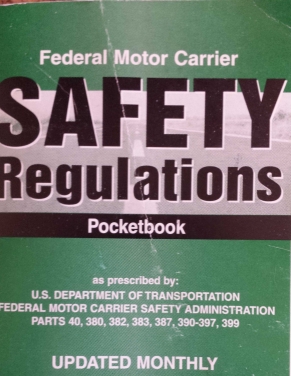A $1 Trillion Omnibus spending bill has provisions to roll back some of the restart provisions of the Federal Motor Carrier Safety Administration (FMCSA) rules regarding Hours of Service (HOS). The 1,600-page spending bill has caused members of Congress on both sides of the political aisle to voice their disapproval of the bill’s passage. However, the bill is still expected to clear both chambers of Congress this week. Some reports have indicated Congress is preparing a stopgap measure to avoid a government shutdown, in case the omnibus does not come to a vote or does not pass. If that happens, the passage of the omnibus and the changes to the Federal Motor Carrier Safety Regulations (FMCSRs) restart provision may not make it through.

Federal Motor Carrier Safety Administration (FMCSA) - Regulations Manual
The trucking industry has been lobbying congress for over 18 months to rollback of some of what the industry believes are the more restrictive elements of FMCSA’s 2013 HOS rules.
The President will likely sign the bill in the coming days. The bill includes a provision that will put a stay on enforcement of two key elements of the 2013 rule: The requirement that a driver’s 34-hour restart include two 1 a.m. to 5 a.m. periods and the provision limiting the use of the restart to one time per week. If passed, the suspension of enforcement will last at least until Sept. 30, 2015.
If the $1.1 trillion spending bill is called the “Consolidated and Further Continuing Appropriations Act, 2015.” The bill prevents a government shutdown and funds most government departments through September 2015. The bill was produced by the House Appropriations Committee Tuesday night, and it has received praise from the Senate Appropriations committee.
If signed into law by President Obama, enforcement of the HOS provisions shall be halted immediately. The bill also directs the Department of Transportation (DOT) Inspector General to initiate a “study of the operational, safety, health and fatigue impacts of the restart provisions.” It further directs the DOT to submit to Congress its conclusions from the study, which it says will show if the 2013 HOS rule “provide[s] a greater net benefit for the operational, safety, health and fatigue impacts” than previous HOS regulations.
The HOS suspension provision has been reported to be a point of contention among members of Congress. The Senate Appropriations committee had voted in June to include suspension of the HOS provisions. According to reports, this portion of the bill is called the “Collins Amendment” and is part of the annual appropriations bill for the DOT. The Senate, however, opposes the Collins Amendment.
Trucking groups including the American Trucking Associations (ATA), based in Arlington VA, and the Owner-Operator Independent Drivers Association (OOIDA), which is based in Grain Valley, MI, supported the Collins Amendment’s inclusion and implementation.
Comments About the Hours of Service Rules Changes From Both Sides:
“We’re appalled at the deal-making and horse-trading behind closed doors and out of the public view,” said Jackie Gillan, president of Washington-based Advocates for Highway and Auto Safety, a watchdog group. “Some elected officials think it’s acceptable to bend to the demands of corporate trucking interests, and it’s acceptable to make political bargains that have life and death consequences.”
“The evidence clearly shows that truck drivers are better rested and more alert after two nights of sleep than one night, and that unending 80-hour work weeks lead to driver fatigue and compromise highway safety,” Foxx said in a letter to senior members of the Senate and House appropriations committees considering the year-end spending plan.
It’s very difficult to get to the 82 hours safety groups are talking about in their “hysterical claims,” says Sean McNally, a spokesman for the ATA. “It would take an imaginary world of near perfect logistics. You time your sleep to the minute, you time your bathroom breaks, you time your meal breaks, your drop-offs and pickups and traffic, and everything works out perfectly,” McNally said. “That world doesn’t exist.”
